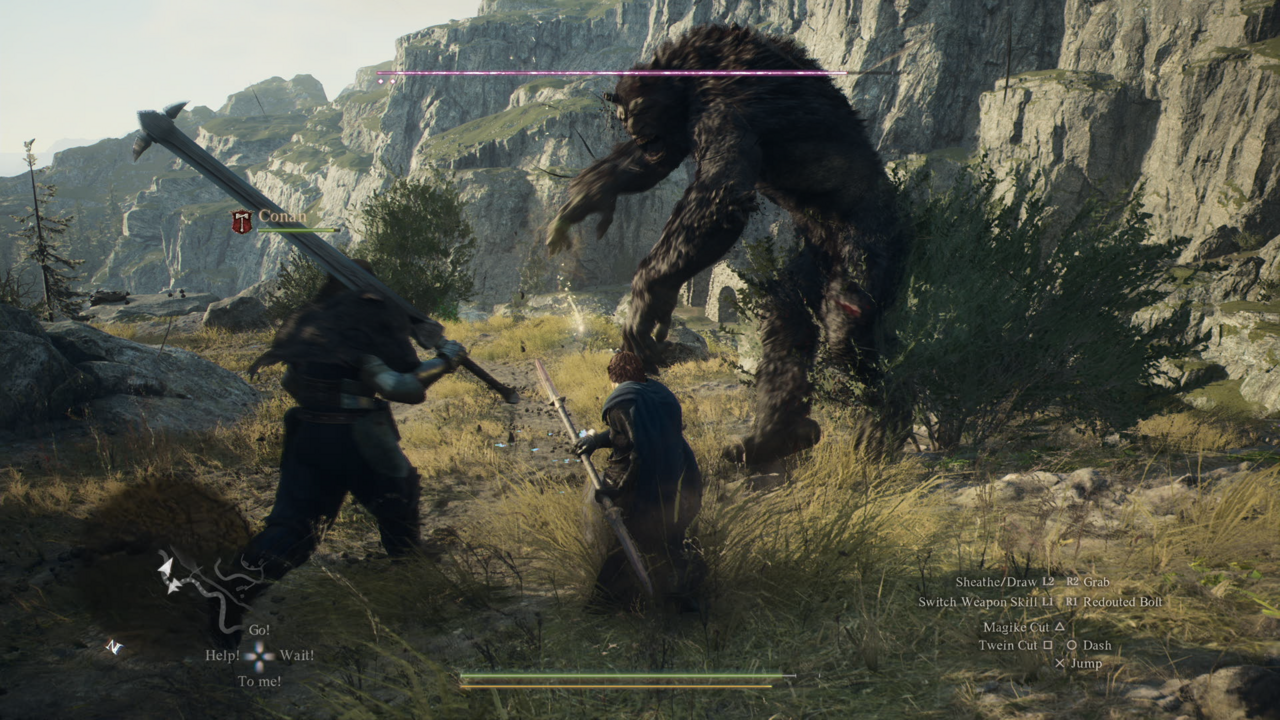Don't miss our holiday offer - 20% OFF!
Dragon’s Dogma 2 Feels Like A Gorgeous Makeover Of The Series’ Core Values
The first time I ventured out into the vast open land of Dragon’s Dogma 2, I was accompanied by my three companions as we followed a lead on a missing young boy, suspected to have been dragged off by a pack of wolves. As I pursued the trail, my crew and I fought off a gang of thieves, sliced our way through banshees, discovered treasure, and battled a giant troll on the edge of a cliff that eventually fell to its death. None of these occurrences were at all related to one another, nor did they pertain to the lost boy that set this journey in motion. Instead, this thread of distinct events emerged naturally and set the tone for the world of Dragon’s Dogma 2. The long-awaited sequel is a giant open land where danger looms around every corner in all shapes and sizes, and regardless of your quest, there’s always the chance a cyclops could unravel your best-laid plans by picking you up and hurling you into the ocean.
Based on the three hours I played at a preview event, Dragon’s Dogma 2 is very much an extension of everything the first game accomplished 12 years ago. It’s an open-world fantasy RPG, mixed with cool-as-hell action combat, and giant mythical monsters to cling onto, with its unique player-created pawn companion system as a centerpiece. It’s all still there from a gameplay perspective, so the most standout change is the RE Engine-powered makeover that aims to place the series’ core values in the best possible light.
Marching out into the grassy open fields of Vermund (one of the game’s two major areas) to explore and fend off giant beasts felt similar to the first game, but the act was given new life due to its technical and visual refinement. There was a sense of density and detail when traversing large and seemingly endless open areas that gave way to smaller towns populated with the hustle and bustle of its residents. There was no load time during these transitions process, and while that’s becoming a norm in many games, there was an organic quality about trudging into a town on the edge of a castle’s gates, having just crossed a vast stretch of land, especially when factoring in the game has no fast travel. There’s something immersive and harrowing about having just survived the grips of a giant griffin, only to realize you have to venture your way back on foot to the nearest town without even the breather of a loading screen.
With that in mind, I was reminded that a lot has changed in the gaming world since the first Dragon’s Dogma released in 2012. We’ve seen the release of two console generations, during which technology has vastly improved, and games like Grand Theft Auto V, The Witcher 3, and Breath of the Wild have altered the way we view open worlds. Sitting down with Dragon’s Dogma 2’s director, Hideaki Itsuno, I asked if there was anything that had come out over the last decade that had influenced the sequel, and his response was actually his own work as director of Devil May Cry 5.
“Through Devil May Cry 5, we had this challenge of seeing how photorealistic we could make an action game look,” Itsuno-san said. “So trying to go towards the edge of how much photorealism can you put into a full action game and getting that experience, getting the feedback–that had a very tangible impact on what we’re aiming at in Dragon’s Dogma 2.”
And it shows. During my time with the game, I got hands-on with a new vocation (class) called the Mystic Spearhand–a magic/melee combo build. Every move displayed, no matter how stylized, still felt grounded thanks to the world reacting realistically, but it also maintained that Devil May Cry-like sense of over-the-top action by sending my character into the air while doing wicked flips. Suffice to say, I felt super-cool doing it, especially when battling alongside my pawns who were doing their own cool set of moves.
Pawns, as they were in the first game, are the game’s unique and standout feature. They are user-created companions that can be traded online between players. By visiting a Riftstone, you can send your own pawns into the rift, where they await being pulled out and used by other players on their own journey. The benefit to using other player’s pawns is that they will carry over items, or even hints and information from other players’ worlds. That remains the same as it did 12 years ago, but this time pawns are far more than mere NPCs who assist you in battle, as they also act as a means to navigate you around the world itself.
Rather than cluttering your screen with waypoints, pawns now help guide you to your next objective. With no set direction on what to do or where to go for my preview, I allowed my pawns to point me in the direction of a quest we were on, physically stopping and pointing things out the environment, or waving me in the right direction to come and follow them. This led to a natural flow in my adventure that didn’t feel weighed down by map navigation and menu screens. While you won’t be building intricate emotional bonds with your pawns like Baldur’s Gate 3’s companions, they’re far more lively than in the first game, chattering among themselves and talking about other masters they adventured with. They also still create a sense of teamwork despite being a single-player game. In a post-Souls world, where summoning other players to assist you in battle has become something of a norm, pawns feel like they could have been a gateway to introducing multiplayer into the Dragon’s Dogma mix. But for director Itsuno-san, he was firm on tailoring an experience to a singular player.
“The thing is, I want to provide the players the most fun experience whether that’s multiplayer or single-player,” he said. “But in my case, I just wanted to make something that was specialized and focused on single-player and that would deliver the best possible experience by being single-player. I’m sure that we could also have done something that was exclusive for multiplayer and try to provide the best possible experience for multiplayer too. The one thing that I wasn’t sure of is, well, if we do something that is single- and multiplayer, then both experiences can be good. But I’m not convinced that you can really provide the best possible experience that has both elements.”
The addition of multiplayer would mean vying for other players’ attention or a lack of focus on a sole objective, and with that in mind, I came to appreciate the pawns more as facilitators within the world itself opposed to filling a void in a single player’s experience. With the lack of fast travel and pawns serving as navigators, the end result is a game that emphasizes natural and seamless exploration.
There was a moment where I found myself pitted against a giant flaming monster at the bottom of a cave. Playing as the Magic Archer vocation, I kept my distance as I fired off magick arrows while my pawns wailed on its feet to knock it to the ground. It was a vicious creature, flinging my pawns around like they were insects, knocking them unconscious one by one, until one picked up their downed allies and carried them to me to revive, completely on their own accord. It was an encouraging scenario in which these AI-controlled companions were genuinely useful and complemented the flow of the experience in a way that playing with others often can’t, not with any reliability anyway. Pawns enriched the adventure and how the world was traversed in ways playing with another player couldn’t. Also, you can high-five your pawns after a battle and it’s the best feeling.
That isn’t to say pawns were always reliable. On more than one occasion, a pawn insisted I follow them, knowing the way to my next destination, only to lead me to a locked gate I couldn’t open. Instead, I stood there watching them march in place, face against the wall. It was pitiful. I was assured that the preview I was playing wasn’t the final build of the game, so there’s still time to iron out those scenarios. It was a small hiccup in a world that was absolutely packed with things to get distracted by and lost in, and it took no time to get pulled in 10 different directions. Inevitably, things are likely to awry now and then even when the game is released.
While I explored, pedestrians would grab my attention to tell me a story, give me insight on town gossip, or even information that could assist me on a quest. It gave the town a sense of life, that everyone there wasn’t just milling about to fill the world, but felt that they had routines and places to be. It was during this time that I learned about the boy taken by wolves, a valuable orb that had gone missing, and some flowers that glow in the night. They didn’t feel like blatant quests to go and follow, but instead information I gathered to go and investigate on my own terms, in my own time, all of which was collected in a quest log to look back on later.

The same was true when exploring the dry, red-washed sandy dunes of Battahl, the other major area of Dragon’s Dogma 2. It was here that I was given a different flavor of the game’s inhabitants, still vying for my attention, albeit with a more hostile tone and sense of grit. Unlike Vermund, which is populated by humans, Battahl is the land of beastren–cat-like humanoids, similar to Elder Scrolls’ khajiit. Battahl featured a more underbelly-like attitude, wedged into the side of the mountains, cast in shadow. The available quests and stories reflected that attitude, like the curmudgeon blacksmith who didn’t want to fix my sword, or the tough guy who started a one-on-one fight with me because I was strutting with a crew of pawns.
In the three hours I played, I felt like I had seen a lot, fought a lot, and explored a lot. But I was also left feeling as though I had barely even scratched the surface of what Dragon’s Dogma 2 has to offer–I never did find the boy who was dragged off by wolves. Instead, I was hurled into a dozen other stories, some the game provided to me, while others I formed from my own exploring. And that’s the biggest impression the preview left on me: the danger, the freedom, and the wonderful happenstance of exploring a world that is densely inhabited by thieves, zombies, wolves, saurians, banshees, orcs, trolls, cyclops, and griffins (just to name the few I saw in my short time) trying to kill me at any moment. It’s a lot, especially considering I hadn’t even touched its main story. It feels like a big world teeming with possibilities and I’m excited to see how it all comes together.

